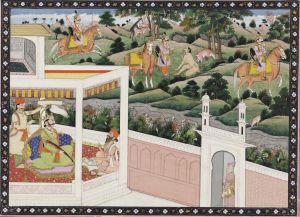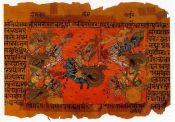Kindama: Difference between revisions
meta>Rudra1104 No edit summary |
By removing false information. |
||
| Line 1: | Line 1: | ||
[[File:Pandu Shoots the Ascetic Kindama.jpg|thumb|right|King [[Pandu]] shoots Kindama]] | [[File:Pandu Shoots the Ascetic Kindama.jpg|thumb|right|King [[Pandu]] shoots Kindama]] | ||
In the [[Hindu]] epic ''[[Mahabharata]]'', '''Kindama''' was a [[rishi]] who lived in the woods | In the [[Hindu]] epic ''[[Mahabharata]]'', '''Kindama''' was a [[rishi]] who lived in the woods. | ||
== Cursing King Pandu == | == Cursing King Pandu == | ||
Revision as of 19:05, 1 September 2017

In the Hindu epic Mahabharata, Kindama was a rishi who lived in the woods.
Cursing King Pandu
Kindama was a very bashful person and his overriding feelings of modesty prevented him from having sex in the company of other humans. To satisfy his sexual desires, Kindama used his powers to turn himself into a deer and took a female deer as mate. Once he and his mate were having intercourse in the woods. King Pandu of Hastinapur, who had been hunting there, shot them mistaking them for deers, seriously injuring them. Enraged Kindama (still in deer form) berated the king for having killed him before he had finished the act of copulation. Before dying, Kindama cursed Pandu that he would die the moment he engaged in intercourse with any woman.[1][2]
After Kindama’s curse, Pandu renounced everything and became a hermit. Dhritarashtra the blind brother of Pandu, became the king of Hastinapur. His first wife Kunti managed to give birth to sons with the help of gods, without Pandu's involvement. Then, after a long time, Pandu was so enthralled by his second wife, Madri's womanly manners, that he could no longer contain his desires. As soon as he attempted intercourse with Madri, he died. Madri immolated herself in her husband’s pyre.
Citations
- ↑ Uberoi, Meera. The Mahabharata. ISBN 9788170702313.
- ↑ Pattanaik, Devdutt (2000). The goddess in India: the five faces of the eternal feminine. Rochester, Vt: Inner Traditions International. ISBN 9780892818075.
